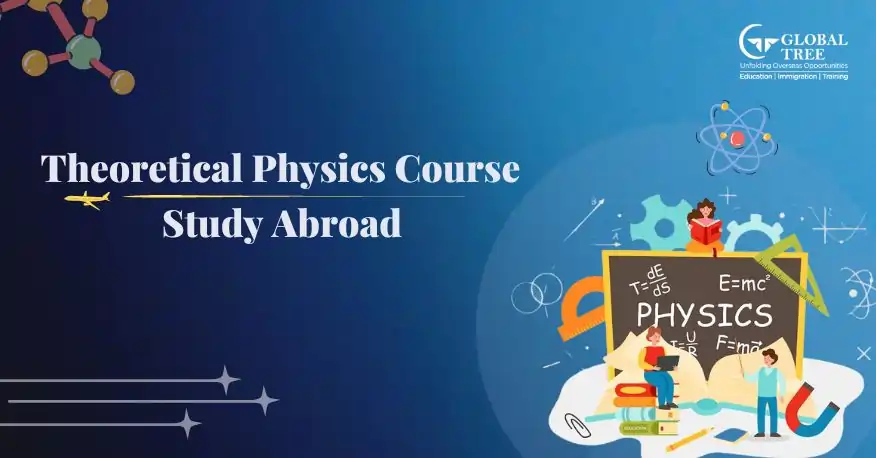Study Theoretical Physics Course Abroad

Introduction
In order to develop theories that account for natural occurrences, theoretical physics makes use of mathematical models, hypotheses, and systems of various abstractions, experiments, and simulations. You will acquire sophisticated research and mathematical skills as well as sharp analytical and problem-solving abilities from this area of physics.
Theoretical physics courses cover a wide range of topics, such as cosmology, thermodynamics, astrophysics, and quantum mechanics. Even though it involves a lot of study, a theoretical physics degree can open doors to rewarding job prospects. Choose the Best Theoretical Physics Course & Colleges to Study Abroad.
Who is eligible to study Theoretical Physics Course Abroad?
A profession in theoretical physics is best suited for an analytical, flexible mind that can "look at the bigger picture" and is capable of thinking beyond the box.
You will succeed in this degree if you have the perseverance and determination to succeed. During high school, students who perform well in math, algebra, statistical mechanics, pre-calculus, and physics have a strong basis for a master’s degree in theoretical physics. This degree is recommended for students who enjoy asking questions and are motivated to find solutions. This degree is one of the hardest degrees in the world.
How much does it cost to study Theoretical Physics Course Abroad?
Theoretical physics is only covered in advanced courses that go up to the bachelor's level. The average tuition and costs for a four-year bachelor's degree in theoretical physics vary depending on the university of your choosing. However, in Australia, the average yearly tuition is AUD 39,800. The students' fundamental basis for theoretical and applied physics will be prepared by a bachelor's degree. Common courses include Newtonian laws, thermodynamics, calculus, electronics, as well as the fundamentals of nuclear and quantum physics. After that, students can find employment as high school physics instructors or research assistants.
It is advantageous for students to pursue research opportunities after completing their bachelor's degree since it helps them get familiar with the practical applications of their field. With research experience, obtaining a master's or postgraduate degree is also simpler.
Graduates of postgraduate degrees must submit an original thesis and are heavily focused on research. The cost of tuition can vary depending on a number of variables, including specialty, duration of study, university, and city. A master's degree takes two years to complete and typically costs between AUD 36,000 and 60,000 in tuition.
The next step is earning a doctorate after completing a master's degree abroad. It typically lasts between four and six years, and it concludes with a dissertation. In the UK, the average total cost of tuition is close to $30,000. Students who successfully complete a PhD can work as physicists in academic institutions and can seek for grants for additional research.
What is the Future Scope of Theoretical Physics Course Abroad?
One can work as a lecturer, federal or private researcher, nuclear physicist, medical physicist, astrophysicist, or cosmologist after earning a degree in theoretical physics. The US Bureau of Labour Statistics reports that the 9% rise in work prospects combined with the high earnings make this a stable and appealing career.
Large funds and investments are anticipated to be directed into the study of theoretical physics due to the rapid advancement of technology and the pressing need to answer fundamental questions about the nature of the cosmos. Theoretical physics is unquestionably one of the most secure and excellent employment prospects in the future.
(Read more: Study Abroad Scholarships for Your Bright Overseas Career)
Trending Career Options in Theoretical Physics Course Abroad
Let's take a close look at a few key professions that you can pursue after majoring in theoretical physics.
Career as a Studying Scientist
Both public and commercial sector organizations engage research scientists. Their main responsibility is to investigate natural phenomena. They develop theories, plan experiments to support their theories, and then write up their results for publication. Research scientists make an average of $83,490 annually.
Career as an Astrophysicist
Astronomers study the universe's stars, planets, and other celestial objects. Their two principal employers in the US are NASA and the Department of Defence. They do, however, collaborate closely with meteorologists and research scientists. Astrophysicists get an average base pay of $117,220 annually.
Career as a Physicist in Medicine
Radiology is a discipline where medical physicists apply their knowledge. They conduct research on how radiation affects the human body, and they frequently serve as consultants for surgeons supervising radiation-intensive operations. Their yearly average pay is $129,183.
(Read more: A Closer Look at the Hardest Degrees in the World)
Career as an Aviation Engineer
Aircraft and spacecraft including satellites, jets, and rockets are designed by aerospace engineers. Companies engaged in space travel and exploration or governments with space initiatives may hire them. To create effective initiatives, they examine and interpret flight data. Their yearly compensation is on average $89,195.
Career as a Cosmologists
A cosmologist is a scientist who studies the characteristics of the universe, such as planets, black holes, and galaxies, using space-based and terrestrial telescopes and satellites. They gather information and keep track of astronomical objects' distance, size, motion, and brightness. An average cosmologist makes $87,818 per year.



 964 260 9000
964 260 9000